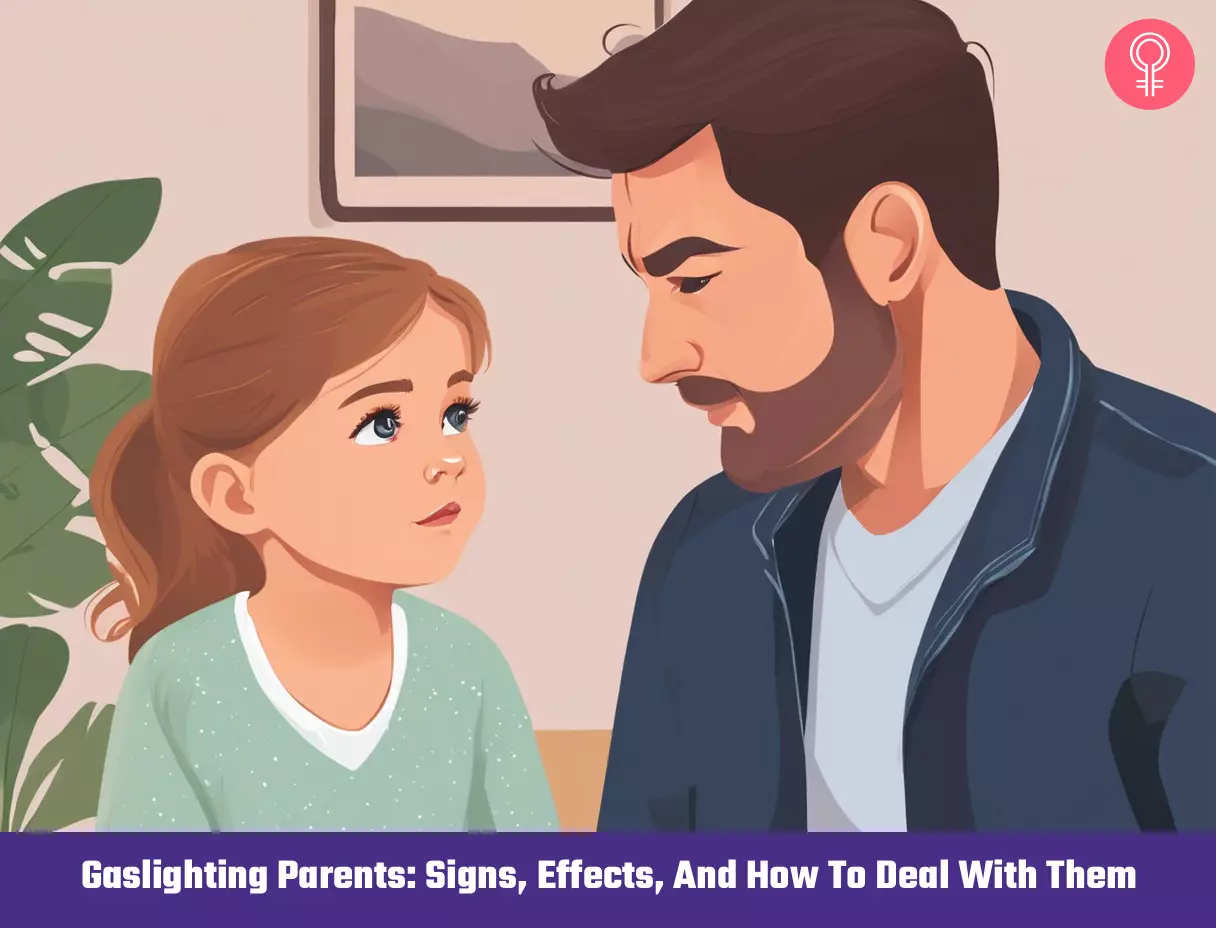Gaslighting Parents: Signs, Effects, And How To Deal With Them
Recognize the signs and understand the ways to regain control over the situation.

Image: ShutterStock
Gaslighting is persistent manipulation or deception that causes the victim to doubt their sanity and original sense of perception.

It can put an individual in a state of confusion and cause them to lose their identity and self-worth. Such emotional abuse works well on people who aren’t confident in their own judgments, but we are all susceptible. Negative narratives, flattery, emotional neglect, reinforcement, or coercion are often used to gain control and wear down the victim.
From family and romantic connections to workplace interactions, gaslighting can manifest in any relationship and influence the power dynamics. In this article, we have discussed gaslighting parents, signs of toxic behaviors or gaslighting techniques used by them, and how to overcome it. Keep reading for more information.
 Did You Know?
Did You Know?In This Article
What Is Gaslight Parenting?

Billy Roberts, a licensed therapist in Columbus, expresses, “A gaslighting parent conditions their child to be obedient by making them question their own reality. They often do this because they are unable to feel vulnerable or take accountability for their actions, a common trait of those with narcissistic personality.”
Billy further adds, “The gaslighting parent could deny events even happened, particularly ones that were hurtful to their children. Also, there is usually a tendency to re-frame a child’s actions as something wrong or bad, particularly in the sense that it blames the child for something that the gaslighting parent is actually to blame.”
Dr. Julia Renedo, licensed clinical psychologist, says, “A parent who gaslights typically exhibits other characteristics of either narcissism or borderline personality disorder. Children with parents who gaslight them will commonly internalize the confusion and emotional pain which they will eventually experience as deep personal shame, insecurity and suffer from very low self-esteem.”
Moreover, gaslighting makes children feel they lack something and question their sanity. It might leave major scars like depression, anxiety, and post-traumatic stress disorder. When someone grows up with everything they say questioned, dismissed as inappropriate, or criticized as wrong, they begin to doubt their worth. Kids who are gaslighted grow into insecure adults, ill-equipped to navigate adult relationships.
Here are some common manipulative phrases children hear from their gaslighting parents often.
- “You are too sensitive.”
- “You are imagining things.”
- “Stop being so dramatic.”
- “You are always overreacting.”
- “I never said that.”
- “You are lucky I’m even putting up with you.”
- “You are making me look bad.”
- “Why are you lying?”
- “Everyone else thinks you are wrong too.”
- “You will understand when you are older.”
- “You’re just like [negative comparison].”
- “You should be grateful for everything I have done for you.”
- “That never happened…”
- “What if I am remembering it wrong?”
- “Maybe I am crazy!”
 Quick Tip
Quick TipSince the behavior of your gaslighting parents may have long-term impacts on your mental health, be open to seeking professional help whenever you experience any psychological issues.
Have these thoughts crossed your mind after a heated discussion with your parents? If yes, unfortunately, you likely have abusive parents and are experiencing gaslighting.
Emily, a blogger, shared her experience of having a gaslighting parent– her mom. She wrote, “My mom used to accuse my tears of being ‘crocodile tears’. (It might’ve been because ‘crocodile tears’ came up elsewhere in our lives because for me that phrase is permanently gonna be associated with my mom, who accused my tears of being fake on MANY occasions by using that exact phrasing.) I mentioned to my dad how I thought (both at the time, and now) that she was kind of right, actually, and I’d sort of felt guilty or like I was caught doing something ‘kind of fake’(i).”
Typical signs of manipulation include gaslighting, constant criticism, and emotional blackmail that can affect self-esteem and mental health. Check out our next section for clear signs of gaslighting parents and their unhealthy traits.
Key Takeaways
- Gaslighting is a type of emotional abuse where a person uses manipulation to make the victim doubt their sanity, perception, and thoughts.
- Parents may gaslight their children when they avoid taking accountability for their actions.
- Making a child feel bad about a situation, undermining their success, and falsely blaming the kid for the parent’s mistakes are a few signs of gaslighting.
- Being resilient, developing boundaries, and establishing support time outside the home are some of the ways to handle a gaslighting parent.
Signs Of Gaslighting Parents

1. Lie, Deny, Or Question Your Memories
If your parents deny, lie, or question your memories or subjective experience, you are being gaslighted. You constantly feel that you have to defend reality, and your trust in your self-intuition erodes. Also, you may feel confused about whether you are on good terms to reassure yourself.
Your parents may blatantly tell you that they did not do or say anything. For instance, they may question the child’s reality or create doubt that they can see things clearly or understand the world around them. You will often find your parents uttering, “I never said that, you must’ve imagined it.”, “That never happened.”, “I have no idea what you’re talking about, and I’m not angry.”
If your parents said or did things that they later denied or lied about, it is a sign of gaslighting. This leads to questioning your perception and memory of what actually happened. Also, it keeps you feeling off-balance and confused. Therefore, planting doubt is detrimental to a child’s self-confidence and can create insecure kids.
2. Minimize Or Invalidate Your Feelings

Gaslighting parents tend to make their child feel worse about the difficult situation – be it a mistake, failure, or daily stress. Instead of being emotionally supportive, they dismiss, reject, and invalidate their child’s feelings. This behavior clearly indicates gaslighting.
If parents trivialize their child’s feelings, it implies their lived experience is insignificant or unacceptable. This can confuse the child, generate self-doubt, and feel they are going crazy. Denial of feelings means your parents want to reinforce that you are wrong, overreacting, or lying. Invalidation is a manipulative tactic to turn things in their favor and blame the victim. You need to be able to identify such signs of emotional manipulation to deal with gaslighting parents.
3. Downplay Your Success And Achievements

Parents that gaslight tend to actively undermine their child’s success and accomplishments. If your parents are never satisfied with your academic grades, career choices, and professional achievements, they may be pushing you away and gaslighting you. As a result, you might feel down, unfulfilled, and frustrated. Without cheers and appreciation from parents for their efforts, a child may feel emotionally drained by getting nothing in return.
On the flip side, your parents might react dramatically to try to exert psychological control and make you change your mind. They will diminish achievements that signify your independence, threaten never to speak to you, or throw your belongings out.
4. Shift Blames And Make False Accusations
If you confront your gaslighting parents about their toxic behavior, they will make false accusations and hold you responsible for things you do not know about. They seldom take accountability for their actions and decisions and always engage in scapegoating by shifting the blame upon children.
Toxic parents reject their role in the troubles and want to turn things around on the child, making them believe they are the wrong ones screwing up the situation. Eventually, the child internalizes these accusations and fosters guilt and negative beliefs about themselves.
5. Always Play the Victim Card
Gaslighting in parents prevents them from seeing their part in life problems. Instead, they believe their children happen to be the cause of their troubles and tend to wreak havoc in their lives. Playing the victim card is a common trait among parents who show signs of narcissism and are covert psychopaths and gaslighters.
Abusive and toxic parents chronically feel like a victim without an apt agency to come out of this bitterness. They are unwilling to break old patterns and use gaslighting to cover their insecurities. For instance, gaslighting parents may blame their kids for increasing stress levels by projecting their personal issues and emotions and scolding them for how they feel.
It can be overbearing to live with manipulative parents. But are they in control of their behavior? Read the next section to learn if they can gaslight you without even realizing it.
Can Parents Gaslight You Unintentionally?
Parents can often unintentionally gaslight their children without intending harm. Factors such as a lack of self-awareness, unresolved personal issues, and communication challenges may contribute to this behavior. Parents may unknowingly dismiss or invalidate their child’s emotions or experiences, making the child question their perceptions.
In these cases, the parents may not be consciously trying to harm their child, but rather acting out of their unresolved issues or coping mechanisms. Understanding and addressing these unintentional patterns can contribute to healthier parent-child relationships.
For example, a toxic mother may use guilt and manipulation to control her child’s actions and emotions.
Gaslighting is an emotionally abusive tactic that makes the victim question their sanity and perception of reality. Here are some life-saving strategies you can adopt to survive your parent’s gaslighting. Scroll down!
How To Deal With Gaslighting Parents

- Remain defiant and do not allow your parents to alter your lived experience, feelings, and memories. You know what you know.
- Be resilient and do not let your parents bully or use verbal intimidation on you.
- Develop healthy detachment and coping mechanisms as early as possible.
- Distinguish between the world of the gaslighters and your real world. Let your parents have their alternative facts, but you stick to reality.
- Maintain a journal and write things that happened. Organize the events and what you feel about them on the pages to make sense of the chaos.
- Champion freedom of speech – say what it needed to be said.
- Validate your reality and trust your version of what happened, even if it is disputed. This will be your testimony and an act of redemption.
- Learn to set boundaries and try not to react.
- Establish a support network and seek help from friends or other family members who understands what you are experiencing.
- Stop rewarding the behavior you do not like by saying goodbye, hanging up the phone, or excusing yourself to take a walk. Instead, lay the ground rule that you will listen, but your parents must not discount your feelings and memories.
- Get some space, meditate, and take a break. Dedicate time to relax, practice wellness, and improve your physical and mental health.
- Do not encourage boundary violation and snap communication ties if you are an adult. Choose when to call, text, and visit your parents.
- Recognize there will never be accountability. Therefore, stop asserting yourself because parents acknowledging their toxic, damaging actions is not in the cards.
- Let go of the wish for it to be different. Do not engage with people who gaslight you and put yourself first.
Valentina Dragomir, a psychotherapist, and life coach, lists a couple of healthy things to deal with a gaslighting parent. Let’s look at what they are:
- Know the signs of gaslighting and be mindful of are. If your parents do this regularly, then expect it will come again at some point.
- If you feel like your parents are putting words into your mouth, then clear it up, make your statement again.
- Confront them, look at the facts. Know your truth, and if you need to, do a fact check. You can ask other people you trust for their opinion if they witnessed the situation.
- Set appropriate boundaries. If you feel that your experience is denied, be aware of what and how you feel and communicate your feelings. Nobody can tell you how you feel. Your feelings are your own.
If you feel your parents’ behavior is still getting to you despite practicing the tips mentioned above, consider seeing a therapist. They will be able to guide you through the complex emotions you are feeling and will provide solutions that will help you in the long run.
Infographics: 5 Signs Of Gaslighting Parents
Gaslighting is a form of toxic manipulation that can make people doubt their sanity and judgment. Often, it can make victims feel like perpetrators with emotional manipulation and false claims and by shifting blame. While the cause of such behavior can be deep-rooted in individuals and takes years to properly unpack, it can manifest in small day-to-day activities. Parental gaslighting can adversely impact the wellbeing of children. Check out the following infographic for signs to identify gaslighting parents.
Some thing wrong with infographic shortcode. please verify shortcode syntaxWe do not expect our parents to be emotionally abusive as we grow under their shadow and rely on them to be our protectors. Understanding the different ways gaslighting in relationships happens can help you maintain confidence and control. However, gaslighting is a personal flaw in an individual that seeps into parenthood and subjects children to a lifetime of trauma. This article tells you everything you need to know about gaslighting parents and how to identify them. It is best to be aware of them as they keep you from realizing your full potential. It would be best to distance yourself from them to preserve your emotional energy. Therefore, identify your needs and step back from gaslighting in parent-child relationships.
Although a gaslighting parent can isolate you, you need not go through it alone. If needed, you may seek help from close family and friends, even therapists and counselors. Make sure to set healthy boundaries with your parents and practice self-care.
Frequently Asked Questions
What are some gaslighting phrases?
A few gaslighting phrases are “you are overreacting,” “I was joking, you took it seriously,” “I’m sorry you felt hurt by what I said,” and “Are you sure I said that or did you imagine it?”
Are gaslighters mentally ill?
Some people with mental disorders like narcissistic personality disorder may have gaslight as a prominent symptom. However, there are cases where the victim of a gaslighter faces more mental stress and exhaustion.
What are the long-term effects of gaslighting?
A victim of gaslighting can face tremendous stress and anxiety. Gaslighters make you question yourself, your thoughts, and your actions. They make their victims feel like they are crazy and imagining things, which seriously affects their mental health.
Illustration: Gaslighting Parents: Signs, Effects, And How To Deal With Them

Image: Stable Diffusion/StyleCraze Design Team
Personal Experience: Source
StyleCraze's articles are interwoven with authentic personal narratives that provide depth and resonance to our content. Below are the sources of the personal accounts referenced in this article.
i. Gaslighting & Crocodile Tearshttps://luvtheheaven.wordpress.com/2016/02/06/gaslighting-crocodile-tears/
Learn how to protect yourself and stand up for yourself in front of gaslighting parents. Check out this video to know more.
Read full bio of Vincenzo Sinisi
Read full bio of Sneha Tete
Read full bio of Subhrojyoti Mukherjee
Read full bio of Sneha Tete



























Community Experiences
Join the conversation and become a part of our empowering community! Share your stories, experiences, and insights to connect with other beauty, lifestyle, and health enthusiasts.